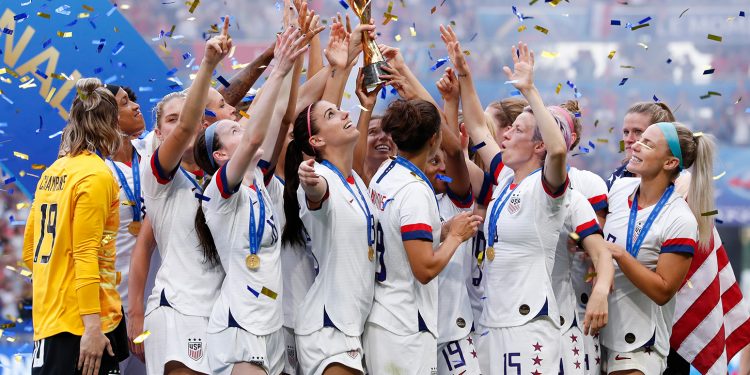For four years, the jersey worn by the U.S. women’s national soccer team has featured three blue stars above the logo, signifying the World Cup championships won across almost three decades.
On Sunday, as the players danced and hugged amid confetti and celebration following a 2-0 victory over the Netherlands, they were handed new shirts made especially for the occasion.
And above the crest — and over their hearts — sat a gold star, recognition of what they had accomplished over four incredible weeks in France and over 90 difficult minutes in front of a sold-out crowd of 57,900 at Stade de Lyon.
“To see us four years ago go from two to three [stars] and now three to four,” forward Alex Morgan said, “it’s really a dream come true.”
USWNT history in Women’s World Cup
The U.S. team has been the beacon for the women’s game, both on and off the field. But until this day, it had never won consecutive world crowns. Four years after lifting the trophy in Canada, the Americans retained the title by scoring twice in an eight-minute span of the second half.
Returning from injury, Megan Rapinoe recorded her sixth goal ― tied with her teammate Morgan and England’s Ellen White for the tournament lead ― on a penalty kick in the 61st minute. Rose Lavelle, a breakout star from the Washington Spirit, scored a terrific goal in the 69th as the United States completed the tournament with seven victories in seven matches.
Rapinoe, an outspoken figure on issues ranging from politics to gender equality, won the Golden Ball as the tournament’s top player.
“I am made for this. I love it,” she said. “To be able to couple it with everything off the field and to back up those words with performances, it’s just incredible. I feel like this team is changing the world around us.”
This championship adds to a portfolio of glory featuring world crowns in 1991, 1999 and 2015 and Olympic gold medals in 1996, 2004, 2008 and 2012. Germany is the only other country to win multiple Women’s World Cups.
A victory parade will take place Wednesday on the streets of Manhattan.
Fans in New York reacted to the U.S. women’s national soccer team beating the Netherlands in the World Cup on July 7. (Allie Caren/The Washington Post)
The Americans have won 13 straight matches and are unbeaten in 16 since losing a friendly at France in January.
Jill Ellis, a native of England who starred at Fairfax County’s Robinson Secondary School and William & Mary, became the first coach to win two Women’s World Cup titles. The only time it has occurred on the men’s side was in 1934 and 1938, by Italy’s Vittorio Pozzo.
The championship was redemptive for both Ellis and her players, who in 2016 lost in the quarterfinals of the Olympics, their earliest elimination in a major tournament.
“I knew after 2016, we had to deconstruct it and reconstruct it,” Ellis said. “That’s what I shared with my bosses [at the U.S. Soccer Federation], and they bought into it.
“To get to this point and see the validation of that and the trust in the players who came through it, it speaks for itself.”
It did not come easy. The Netherlands, appearing in its second World Cup, thwarted the Americans in the first half and created danger of its own. The United States was the better team, but the score did not reflect it until the second half.
The Netherlands was physical and unafraid. Unlike the previous six matches, the United States failed to score in the first dozen minutes.
The United States probed for ways to unlock the Dutch defense but ran into firm road blocks. The challengers also applied pressure on the ball in midfield, resulting in wayward passes and giveaways.
When the Americans did create opportunities, goalkeeper Sari van Veenendaal made terrific saves.
Ellis said she told her team at halftime, “At some point, it’s going to break and it’s going to break our way, whether that is through a penalty kick or through a set piece or in transition.”
It did with a penalty kick, which was awarded via video replay.
In challenging Morgan in the penalty area, Stefanie van der Gragt raised her right foot and caught the U.S. player in the upper right arm. Morgan went down.
French referee Stephanie Frappart did not whistle a foul, but as the United States prepared for a corner kick, Carlos del Cerro Grande, the video assistant referee, recommended a review.
Frappart returned from the sideline with the verdict: penalty kick.
As van Veenendaal leaned one way, Rapinoe delivered the other way. She celebrated with her iconic pose, arms outstretched on an angle and a smile for the crowd.

Megan Rapinoe, after opening the scoring in the Women’s World Cup final. (Francisco Seco/AP)
“Of course, it was a turning point,” said Dutch Coach Sarina Wiegman, who had not seen a replay of the decisive foul immediately after the game. “It was disappointing to us.”
Eight minutes later, Lavelle extended the lead. The Dutch defense parted, and the slight midfielder took full advantage.
She surged into an acre of space, forcing van der Gragt off balance before veering to her left and stamping a left-footed shot from 17 yards, out of van Veenendaal’s reach and into the far corner.
“Over the course of the game, it was hard to find that kind of space,” said Lavelle, 24. “Finally, there was an opportunity to take space. I decided to go for it. … I like my left foot, man, and I got it on my left foot.”
With the Dutch pressing forward, the United States had ample opportunity to turn the match into a rout. However, the touch inside the box was off, and van Veenendaal continued her excellent work.
Rapinoe left to a roaring ovation in the 79th minute. Carli Lloyd, the hat-trick hero of the 2015 final in Vancouver who will turn 37 this month, entered in the waning moments.
All that was left to do was wait for Frappart’s closing whistle and commence a celebration four years in the making.
“I feel like we did the impossible today and this past month and these past couple years,” said defender Kelley O’Hara, who exited at halftime after a head-to-head collision. “I’m so proud of this team. It’s a testament to how dedicated everyone is. You can want to win a World Cup, but winning one is a different story.”


















